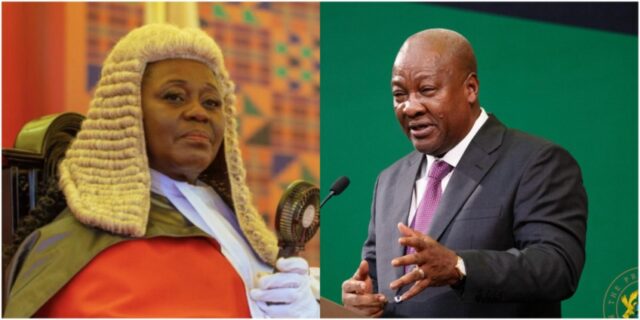In a historic legal move, Chief Justice Gertrude Torkornoo has filed a suit at the ECOWAS Court of Justice, demanding $10 million in compensation for what she describes as moral and reputational damage stemming from her suspension by President John Dramani Mahama.
This marks the first time in Ghana’s history that a sitting Chief Justice has been subjected to removal proceedings, with Justice Torkornoo’s legal action now placing Ghana’s constitutional and judicial processes under intense regional scrutiny.
The suit, confirmed by judiciary sources, challenges the legitimacy of the Chief Justice’s suspension on April 22, 2025, and the ongoing investigation into allegations of misconduct. Justice Torkornoo claims the suspension violates her fundamental human rights under the African Charter on Human and Peoples’ Rights.
Key declarations sought
In her extensive filing, Chief Justice Torkornoo seeks several declarations from the regional court, including:
- That her suspension violated her right to a fair hearing (Article 7 of the African Charter).
- That the investigative panel set up by the Ghanaian government lacked independence and impartiality.
- That her right to fair, equitable, and satisfactory conditions of work (Article 15) was breached.
- That the suspension exposed her to public ridicule and violated her right to dignity (Article 5).
- That the ongoing proceedings have caused irreversible damage to her professional image and subjected her and her family to public humiliation.
Beyond the declarations, the Chief Justice is requesting the ECOWAS Court to Order Ghana to halt the suspension process, restore her official status and award her $10 million in compensation for the alleged rights violations and reputational damage.
Background to the case
President Mahama invoked Article 146 of the 1992 Constitution to suspend Justice Torkornoo pending an investigation.
This article sets out the procedure for removing justices of the Superior Courts, requiring a prima facie case to be determined by the Council of State before a committee of inquiry is established.
Justice Torkornoo previously challenged aspects of the removal process in Ghana’s domestic courts. Her application to halt the committee’s work was dismissed by the Supreme Court in May 2025 on procedural grounds, though key constitutional questions remain unresolved.
Legal analysts say the case could reshape the interpretation of judicial independence and human rights protections in Ghana and across the ECOWAS region. While some critics argue that she must exhaust local remedies first, the ECOWAS Court has previously ruled that individuals can approach it even if domestic proceedings are still ongoing—so long as the matter is not before another international tribunal.
This unprecedented suit, involving the highest-ranking judicial officer in Ghana, underscores the serious legal and constitutional questions at stake.
The ECOWAS Court’s decision could have wide-ranging consequences not only for Chief Justice Torkornoo’s career but also for the credibility of Ghana’s democratic institutions.








